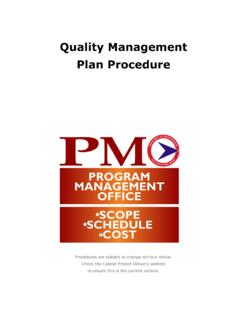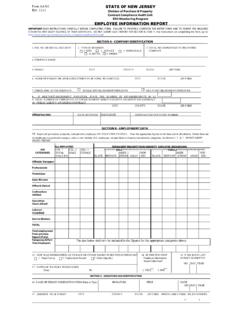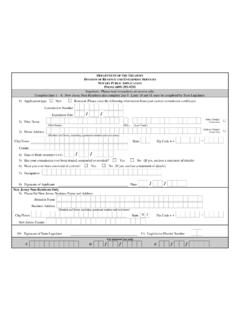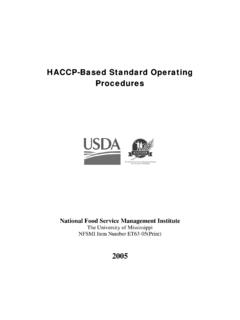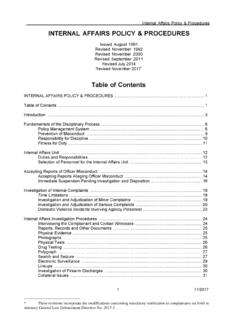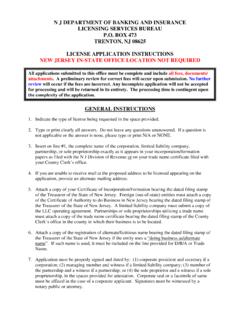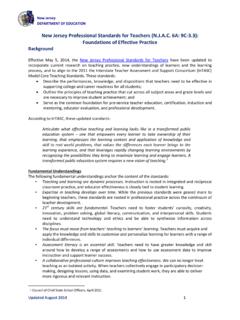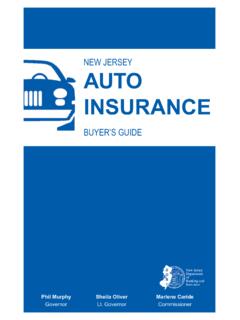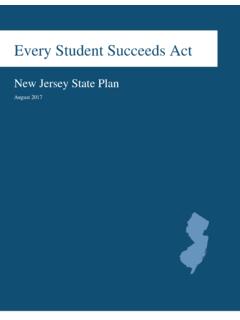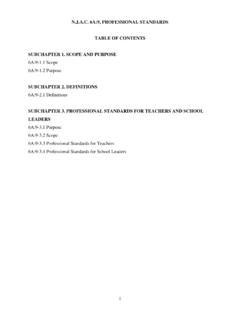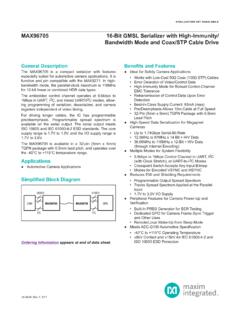Transcription of Cloud Computing (SaaS, PaaS, IaaS) - State
1 Page 1 Cloud Computing (SaaS, PaaS, IaaS) TB-72 Issued July 3, 2013 Tax: Sales and Use Tax This Technical Bulletin addresses the application of the New Jersey Sales and Use Tax Act ( 54:32B-1 et seq.) to the sale of Cloud Computing . Cloud Computing refers to services that allow a customer to access and use the software of a service provider. The software is hosted by a seller that owns, operates, and maintains the software. The seller houses the software on its own servers. Customers access the software via the Internet. The software is not transferred to the customer, nor does the customer have the right to download, copy, or modify the software. Rather, customers merely receive access to the software. Cloud Computing is offered in three product categories: Software as a Service ( SaaS ), Platform as a Service ( PaaS ), and Infrastructure as a Service ( IaaS ).
2 Cloud Computing is distinguished from the purchase of downloaded or otherwise electronically delivered software, which is taxable as the sale of tangible personal property unless the business use exemption is applicable to the purchase. (See TB-51R, Taxability of Software). In addition, the Sales and Use Tax Act imposes tax on information services, regardless of the fact that such services may meet the above description of Cloud Computing . RELEVANT STATUTES The receipts from every retail sale of tangible personal property or a specified digital except as otherwise provided in this act are subject to Sales Tax. 54:32B-3(a). Tangible personal property means personal property that can be seen, weighed, measured, felt, or touched, or that is in any other manner perceptible to the senses. Tangible personal property computer software including prewritten computer software delivered electronically.
3 54:32B-2(g). Sale is defined as any transfer of title or possession or both, exchange or barter, rental, lease or license to use or consume, conditional or otherwise, in any manner or by any means whatsoever for a 54:32B-2(f). Sales price includes the total amount of consideration, without any deduction for the seller s expenses in selling the goods or service. 54:32B-2(oo). Receipts from sales of prewritten computer software delivered electronically and used directly and exclusively in the conduct of the purchaser s business, trade, or occupation are exempt from sales and use tax. 54 Delivered electronically means delivered to the purchaser by means other than tangible storage media. 54 The sale of information services received by customers in New Jersey is subject to Sales Tax. 54:32B-3(b)(12). Page 2 Information services means the furnishing of information of any kind, which has been collected, compiled, or analyzed by the seller, and provided through any means or method, other than personal or individual information which is not incorporated into reports furnished to other people.
4 54:32B-2(yy). SOFTWARE AS A SERVICE (SAAS) SaaS providers offer the use of software on a per transaction basis, through a service contract, or by subscription. SaaS providers do not transfer software to their customers. Rather, SaaS providers only allow customers to access software through remote means. SaaS providers obtain licenses to use the software they offer their customers, perform regular maintenance on that software (generally in the form of updates, etc.), and maintain server space to house the software. Examples of SaaS are Salesforce, Google Apps, and DeskAway. SAAS IS NOT THE SALE OF TANGIBLE PROPERTY The definition of tangible personal property includes prewritten computer software delivered electronically. 54:32B-2(g). Because SaaS only provides the customer with access to the software and the software is not delivered electronically, it is not the sale of tangible personal property.
5 SaaS providers fully retain and operate the software applications to which they sell access. Customers only have access to the software through remote means. SaaS customers do not receive title or take possession of the software. The SaaS provider uses the software it owns or licenses to provide the service and does not transfer the software to its customers. An SaaS provider is not treated as a reseller of a license to use the software. Therefore, the sale of SaaS is not a sale of tangible personal property. Rather it is the sale of a service. 54:32B-3(a); 54:32B-2(f). IS THE SALE OF SAAS THE SALE OF AN ENUMERATED SERVICE? Services delivered into New Jersey are taxable when they are specifically listed under 54:32B-3. Use of a software application is not listed as a taxable service. Therefore, most charges for SaaS are not subject to Sales Tax.
6 However, SaaS which meets the definition of an information service is subject to Sales Tax. Charges for SaaS where the software is accessed and used as a tool for providing information to customers by an information service provider are sales of information services. The law defines information services as the furnishing of information of any kind, which has been collected, compiled, or analyzed by the seller, and provided through any means or method, other than personal or individual information which is not incorporated into reports furnished to other people. 54:32B-3(b)(12). Some common examples of taxable information services which are conveyed through SaaS are Westlaw, LexisNexis, CCH, and RIA. When use of the software does not relate to the provision of information services, SaaS is not subject to Sales Tax. Page 3 SAAS PROVIDER S TAX OBLIGATIONS The SaaS provider is the owner of the underlying software and is selling access to the software rather than the software itself.
7 As such, the SaaS provider must pay Sales Tax on the purchase of any software used to provide the service, except where the business use exemption is applicable. 54:32B-3(a); 54 PLATFORM AS A SERVICE (PAAS) PaaS provides customers access to Computing platforms. PaaS customers create software using tools and/or libraries provided by the PaaS providers. The PaaS provider provides the networks, servers, storage, and other services. Platforms are operating systems. Some common examples include Windows XP or Mac OS X. PAAS IS NOT THE SALE OF TANGIBLE PROPERTY The definition of tangible personal property includes prewritten computer software delivered electronically. 54:32B-2(g). Prewritten computer software includes operating systems and software applications. Because PaaS only provides the customer with access to the software and the software is not delivered electronically, it is not the sale of tangible personal property.
8 Further, PaaS providers fully retain and operate the software applications to which they sell access. Customers only have access to the software through remote means. PaaS customers do not receive title or take possession of the software. The PaaS provider uses the software it owns or licenses to provide the service and does not transfer the software to its customers either as is, or as a component part of its service. A PaaS provider is not treated as a reseller of a license to use the software. Therefore, the sale of PaaS is not a sale of tangible personal property. Rather it is the sale of a service. 54:32B-3(a); 54:32B-2(f). IS THE SALE OF PAAS THE SALE OF AN ENUMERATED SERVICE? Services delivered into New Jersey are taxable when they are specifically listed under 54:32B-3. Use of a software application or platform is not listed as a taxable service.
9 When use of the software is the true object of the sale, PaaS is not subject to Sales Tax. So long as the use and access to PaaS does not include the transfer of tangible personal property, the sale of PaaS is not subject to Sales Tax. This is true whether the software is located on a server in New Jersey or on a server outside the State . PAAS PROVIDER S TAX OBLIGATIONS The PaaS provider is the owner of the underlying software and is selling access to the software rather than the software itself. As such, the PaaS provider must pay Sales Tax on the purchase of any software used to provide the service, except when the business use exemption is applicable. 54:32B-3(a); 54 The PaaS provider also must pay tax on the purchase of any hardware or other equipment used to perform the service. 54:32B-3(a). INFRASTRUCTURE AS A SERVICE (IAAS) IaaS providers purchase and maintain hardware, software, and any other equipment and services necessary to support and manage the content and dataflow of its customers.
10 IaaS may be viewed as the outsourcing of IT functions. It may be purchased as part of a disaster recovery strategy, or it may provide the backbone to support fast-paced secure transactions pursuant to a long-term arrangement. Page 4 As with the other Cloud Computing products, IaaS providers maintain ownership of the software, hardware, and other equipment purchased for use in providing the service. IaaS providers address a wide range of needs. An IaaS provider may only need a few servers to support some customers, or may maintain and operate large facilities filled with hardware and equipment. IAAS IS NOT THE SALE OF TANGIBLE PROPERTY The definition of tangible personal property includes prewritten computer software delivered electronically. 54:32B-2(g). Because IaaS only provides the customer with access to the software and the software is not delivered electronically, it is not the sale of tangible personal property.
